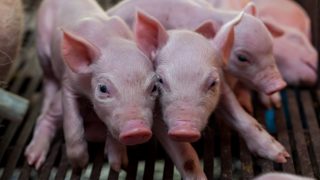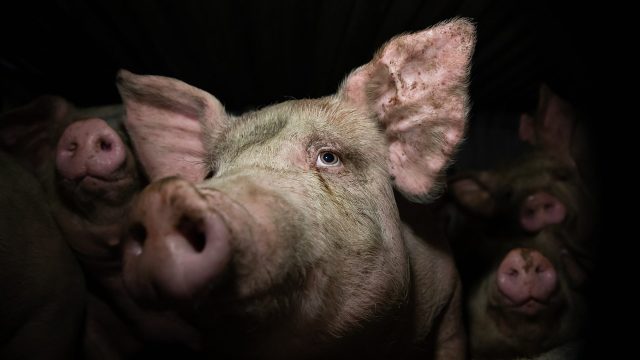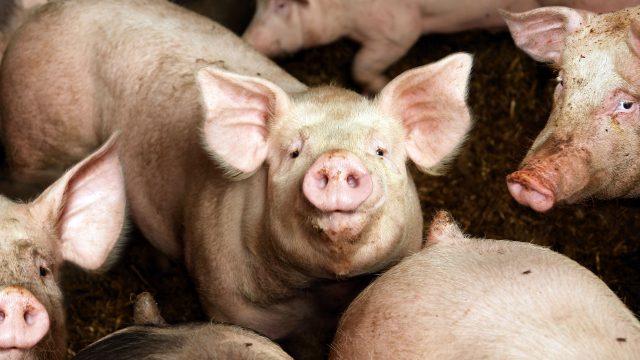
HIMP: Inherently Cruel for Pigs
Despite disapproval from public health and safety organizations and animal protection groups, the United States Department of Agriculture (USDA) recently announced it will finalize the euphemistically named “Modernization of Pork Slaughter” rule.
The rule would expand a problematic pilot program that allows slaughterhouses to radically increase the speed with which pigs are slaughtered while at the same time decreasing government oversight of food safety by largely putting the slaughterhouses in charge of policing themselves.
Called the swine Hazard Analysis and Critical Control Point (HACCP)-based Inspection Models Project (HIMP), the HIMP program started in 1997 with five hog slaughterhouses. Since its inception, HIMP has been widely criticized because it increases pigs’ suffering, and threatens consumer and worker safety.
The Slaughter Process
Under HIMP, slaughterhouses process pigs at very high line speeds. “Line speeds” is an industry term that refers to the speed with which an animal is killed and then dismembered to be packaged and sold for human consumption. Under the Federal Meat Inspection Act, the USDA is charged with inspecting slaughterhouses to ensure meat processed therein is safe for human consumption and animals are slaughtered only using humane methods.
However, meat conglomerates strive to kill and process as many animals as possible to maximize profit; the suffering of pigs is an unimportant side effect of this drive for ever faster slaughter speeds and greater profits.
High Line Speeds Endanger Human Health and Increase Animal Suffering
At very high line speeds, employees cannot identify bile contamination and animal parts that should be removed (like hair and toenails). But most worrisome is the impact that high line speeds have on the animals.
Federal law requires pigs to be rendered unconscious before they are killed. Usually, a pig is made unconscious by stunning her in the head with a captive bolt gun or shocking her with an electric current. But with the line moving so quickly and with little time to properly stun the animal, numerous undercover investigations and employee testimony have confirmed that many pigs are still alive as they bleed out or, even worse, are boiled to death alive in a scalding tank (pigs are put in scalding tanks to soften the skin and remove hair). Additionally, employees struggling to keep up sometimes resort to beating, kicking, and shocking pigs.
Given the risks inherent in increasing line speeds, the USDA should exercise greater oversight over HIMP plants, not less. Yet under HIMP, the USDA’s Food Safety and Inspection Service inspectors turn many of their monitoring duties over to slaughterhouse employees, allowing the companies to inspect and police themselves.
Untrained employees may face retaliation for stopping the line to correct problems—a strong disincentive against addressing animal suffering or contamination.
Companies with Histories of Animal Abuse Participate in HIMP
Hormel Foods, a corporation with a history of animal abuse, is one of the participants in the HIMP program. In 2016, the Animal Legal Defense Fund obtained undercover footage from a pig breeding facility operated by The Maschhoffs, LLC which provides pigs to Hormel Foods.
The footage was shocking. Pigs suffered for weeks with prolapsed rectums, gaping open wounds, and bloody cysts among other illnesses. Pigs went hungry for long periods of time causing them to become distressed and injure themselves.
The Animal Legal Defense Fund also filed a lawsuit against Hormel Foods, alleging the company was misleading consumers by advertising its Natural Choice™ meats as “100% natural,” when instead they are sourced from factory farms that use hormones, antibiotics, and other veterinary drugs, and which confine animals in cramped, unnatural conditions.
A 2015 Consumer Reports survey found over half of consumers believed “natural” meat and poultry comes from animals not fed antibiotics or artificial growth hormones, and half believed the animals went outdoors—misperceptions Hormel cynically exploited with its “Make the Natural Choice” advertising campaign.
HIMP Should Be Ended, Not Expanded
Millions of pigs will suffer under an expanded HIMP program. The Animal Legal Defense Fund is a signatory to a coalition letter to the USDA urging that the HIMP program not be expanded.
We also urge Animal Legal Defense Fund supporters to sign a petition asking the USDA not to expand this dangerous program. At the time of writing, over 225,000 people have signed the petition.
The factory farming industry requires more oversight, not less. It’s time for the USDA to end the disastrous HIMP program.
Focus Area
How We Work
Related
-
ALDF Partners with Advocates to Challenge EPA for Discarding Slaughterhouse Water Pollution Rules
10 Organizations petition federal court over EPA’s abandonment of rules to reduce pollution from meat processing industrySeptember 19, 2025 News -
Pigs and Public Health Act Reintroduced in the U.S. House to Prohibit Slaughter of Downed Pigs
Bill will reduce the risk of zoonotic disease transmission and foodborne illness by establishing new standards for non-ambulatory, or “downed” pigsJuly 25, 2025 Press Release -
Petition Urges FDA to Reconsider Decision Not to Ban Controversial Drug Ractopamine
Common livestock feed additive poses risks to human healthApril 29, 2025 Press Release



